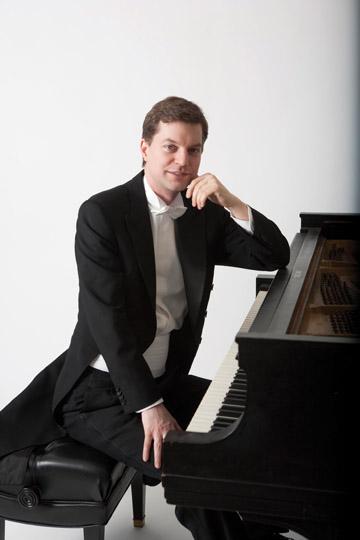Till Fellner: Past, Present and Future of Classical Music
By • May 3, 2012 0 947

There are certain images that come to mind when you think of classical music, and pianist Till Fellner, a rising star in the world of classical music performers, embodies quite a few of those if you’ve ever seen him perform.
The last time Washington saw Fellner, who is being presented by the Washington Performing Arts Society at the Kennedy Center Oct. 1, he played at the Austrian Embassy as part of Jerome Barry’s Embassy Series Season, which was also the concluding program in Fellner’s ambitious project to perform the complete 32-part cycle of Beethoven sonatas.
Played on a Sunday afternoon before a sold-out but intimate audience, the Embassy Series program was a coming together of artist, music and audience, and a rather romantic display of the culture of classical music. It came with all the practiced history and rituals one would hope for, from the hollering of “Bravo!” to the flying of tailcoats.
An occasion like this has its roots in the 18th and 19th centuries, when music was played in front of kings and members of the courts. It was played by candlelight and under chandeliers, in churches and the drawing rooms of aristocracy. The audiences are no longer quite so elite or powerful, but certain manners, mannerisms and behavioral traditions still persist. Just like the tradition remains that important cast members take curtain calls in between acts at an opera, so there are certain expectations at a concert or recital. After all, the music of the classical Forefathers—in this case Beethoven—is being played.
Fellner is Viennese and European to the core, but he is also a citizen of the world by dint of the global explosion of interest and competition in classical music. He understands and appreciates the seriousness of what he does. “The music is all that matters,” he said in a brief international telephone conversation, where he was taking in the evening tide in the old city of Vienna. “You are in service to the music, it’s the most important thing there is. And on such occasions, there are certain ways of doing things. There’s a respect that is due to the music, from myself playing it to the best of my abilities and understanding, and from the audience in terms of listening.”
You don’t get grand gestures from Fellner, no thumping on the keys with over emphasized drama, no hair or headshaking that one might get from musicians who play the keys to elicit applause. Fellner, although tall and almost boyishly handsome at age 38, will not try to seduce an audience with body language. Rather, he tries to ford the defenses of the heart with perfect performances and worship the music with his playing.
The airy embassy spaces, sunlit and bright, were an ideal setting. Fellner walked up to the shiny black piano with a quick and friendly nod, resplendent in tuxedo and tails, sat at the piano—arranging the tails just so—and began to play to the kind of communal silence that sometimes catches you off guard.
“I believe,” he said, in precise and fluent English, “that there are certain traditions to be followed, and that it is a part of the music, the occasion. There’s a certain formality and I like that, but it doesn’t interfere with feelings and emotions.”
Fellner carries with him the life of a concert pianist, and with it a mountain of ever-growing challenges. He lives in a world that seems to be at a contradictory phase—there are more and more classical musicians being trained all over the world, especially in Asia, while at the same time interest in classical music, while not in any sort of dramatic decline, still seems pointed to a closed world made up of the affording class.
But bridges are being built in the music industry, often with real artists on the forefront, who fuse their talents with giants from the world of pop music. But Fellner isn’t one of them—at least not yet. “I like some popular music,” he said. “Some of the artists are very good. But on the whole, I’m not that interested in rock music and things like that, nor do I have any desire to play it. There are plenty of challenges in playing the music that already exists—every pianist, violinist and so on takes on projects that are difficult and challenging. And the Sonatas was one of mine.”
Still, Fellner understands that the classical repertoire—Beethoven, Bach, Mozart, Brahms and Wagner, to name a few—needs to be replenished and added to, and he’s not stuck in the past in that sense.
“There’s actually a lot of new composers and new classical music being written, and I also like playing the works of the 20th century composers. There is a different sort of challenge in the new.”
Fellner’s program at the Kennedy Center’s Terrace Theater on Oct. 1 is a kind of indicator of direction: the richness of the past and the potential for the future. There are Haydn, Schumann, and Liszt, and there is also 19-year-old classical music sensation Kit Armstrong.
“Kit is a prodigy. As a performer, as a composer, he’s just amazing,” Fellner said. “I’m playing ‘Half of One, Six Dozens of the Other,’ which he wrote for me in 2010.”
Fellner has been praised all over world and received raves like this from the London Observer: “Fellner confirmed his standing among the foremost keyboard virtuosi of the day; exact, limpid and feather-fingered, he exquisitely conveyed the sense of yearning haunting the andante and cruised effortlessly through the teasing syncopations of the closing allegro of Mozart’s Piano Concerto No. 18.”
He will treat Armstrong’s music like he treats a Beethoven sonata, as if in the interpretive position of high priest.
Till Fellner will be performing at the Kennedy Center on Oct. 1, presented by the Washington Performing Arts Society. For more information visit Kennedy-Center.org

